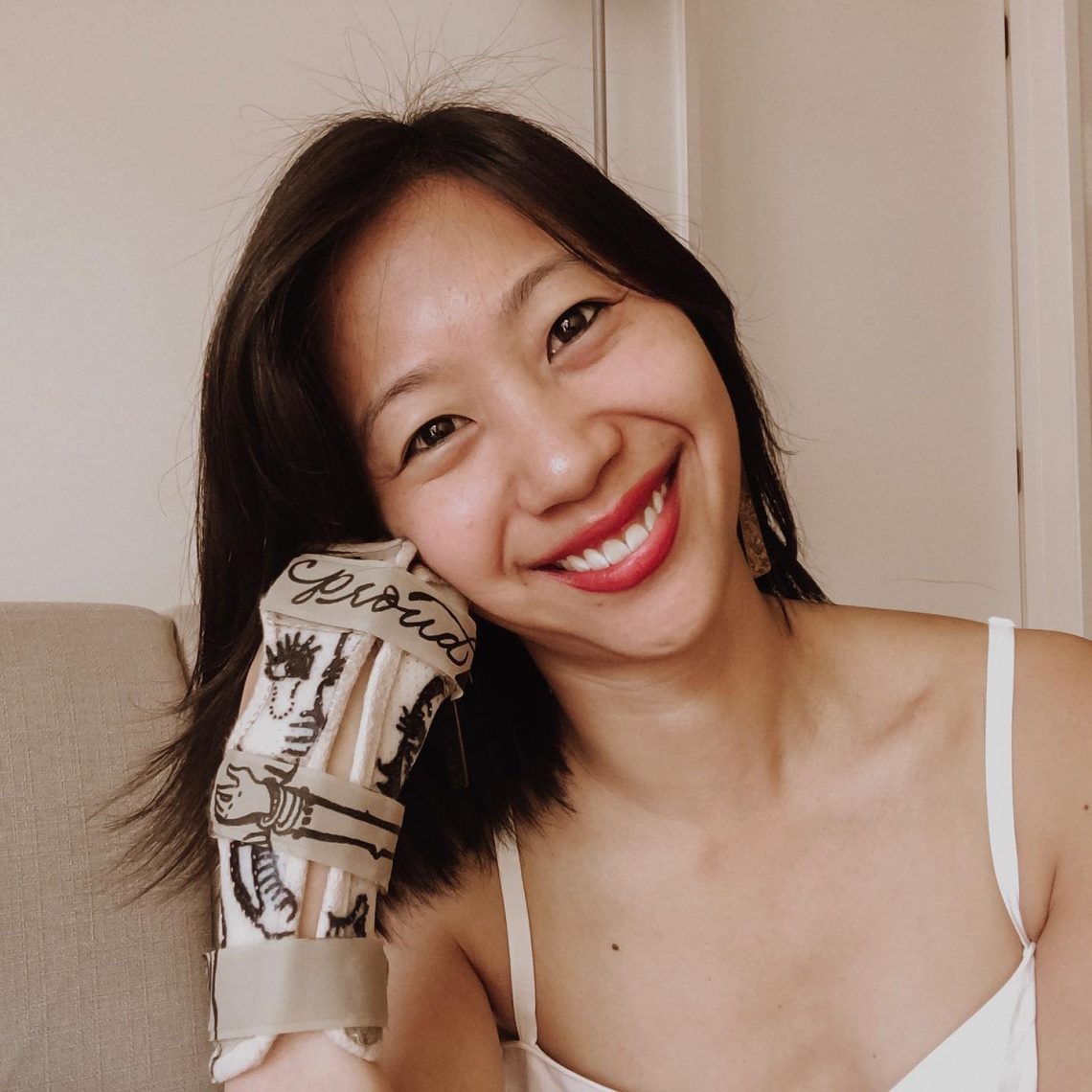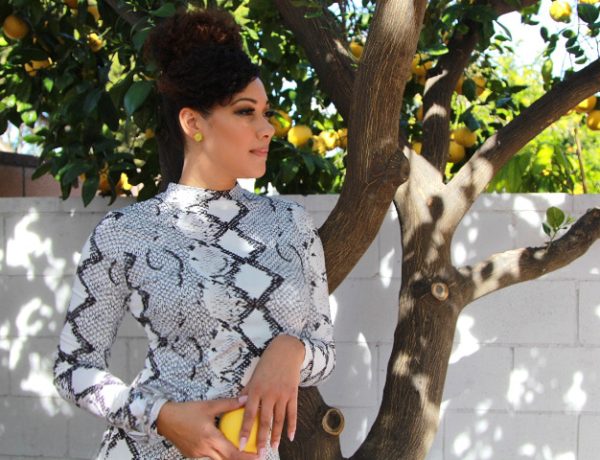Impact matters to disability advocate Tiffany Yu, regardless of scale. ”It can look so many different ways, whether it’s a one-to-one conversation with someone or coaching someone by reviewing their resume and doing mock interviews with them to creating a short form video series that reaches millions of people,” she says. It’s one aspect of what motivates her in her work with Diversability, an initiative she started to augment disability pride through connection and community dialogue. “If we get one person paid, that feels like impact. If we get one person a job or welcome someone new to our team, then that’s a success.” The impetus for founding Diversability came from Tiffany’s desire to reorient her relationship with disability to move beyond secrecy and stigma. “I started Diversability as a campus club back in 2009. Our tagline was ‘A Movement to Celebrate Disability Pride.’ And now, 13 years later, it’s ‘Elevating Disability Pride Together.’ But at the time, I think I just felt really alone and isolated and excluded in my disability experience. So much of my own self-image was rooted in this tragedy model of disability. I got into a car accident 25 years ago. I was nine, my dad was driving, he passed away. I acquired a slew of injuries, including breaking a couple bones in one of my legs. I was in a wheelchair for four months during my rehabilitation period. I permanently paralyzed my arm and then much later I’d be diagnosed with PTSD. Because I’m the daughter of Asian immigrants, it was instilled in me that we shouldn’t talk about anything that might be seen as “shameful” or make our family look bad. In my family, the car accident, the fact that my dad died, and the fact that I now had an apparent disability were all seen as shameful because the the old way of traditional thinking was that if something like the car accident happened or your husband died or your kid became disabled, it must mean something is wrong with your family. And if that word got out about that, then no one would want to associate with your family.”
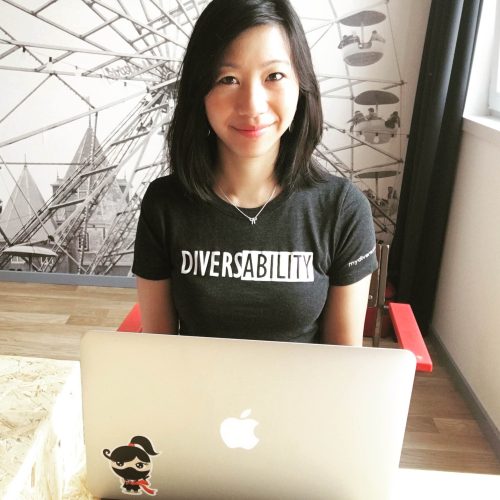 Fear of ostracism dictated the next decade plus of her life, to the extent of hiding the trauma – and even her dad’s death – from others. “For about 12 years, I didn’t tell anyone about the car accident. That’s 1997 until 2009. And so in 2009 when I came up with this idea for Diversibility in its initial form, it was really realizing that I haven’t told anyone about this event that has happened to me and I have diminished its significance. I have told people my dad was away on a trip, and I have effectively, through my own internalized ableism, tried to operate as a non-disabled person, but I’m not,” Tiffany laughs. In the ensuing years, her perspective on the disability movement has evolved in tandem with Diversability’s expanding mission. “One thing is part of why we decided to focus on disability pride and not just raising disability awareness is I think that people can be aware of disability, but still think that our lives are tragic and still think that it’s okay for us to be dehumanized and restrict our human rights. The second thing is that in collective, in community, we are so powerful together. I don’t really see myself as one solo disability advocate. The emergence of disabled influencers or disabled content creators during the pandemic shows that by directly or indirectly cheering each other on or making space for each other, in this world now, many more of us can be paid significantly to spread these advocacy messages in ways that work for us. We thrive on social media because that’s how we meet each other. Existing online is something that, for many of us, has been our first place to find community. Which brings me to my third thing (because everything good comes in threes). I think we need to be better about celebrating and acknowledging nuance in intersectionality and the individuality of our experiences for us to move forward. Oftentimes I may say something and someone will say, ‘Well, that’s not my experience.’ And I say, ‘Yes, we’re not a monolith, but how can we also acknowledge the lateral ableism that might exist when someone comes in and says, ‘I’m okay with these words. I don’t have a problem. I don’t get offended if someone says this,” without thinking of the broader collective or of how language has the power to empower or disempower our community.”
Fear of ostracism dictated the next decade plus of her life, to the extent of hiding the trauma – and even her dad’s death – from others. “For about 12 years, I didn’t tell anyone about the car accident. That’s 1997 until 2009. And so in 2009 when I came up with this idea for Diversibility in its initial form, it was really realizing that I haven’t told anyone about this event that has happened to me and I have diminished its significance. I have told people my dad was away on a trip, and I have effectively, through my own internalized ableism, tried to operate as a non-disabled person, but I’m not,” Tiffany laughs. In the ensuing years, her perspective on the disability movement has evolved in tandem with Diversability’s expanding mission. “One thing is part of why we decided to focus on disability pride and not just raising disability awareness is I think that people can be aware of disability, but still think that our lives are tragic and still think that it’s okay for us to be dehumanized and restrict our human rights. The second thing is that in collective, in community, we are so powerful together. I don’t really see myself as one solo disability advocate. The emergence of disabled influencers or disabled content creators during the pandemic shows that by directly or indirectly cheering each other on or making space for each other, in this world now, many more of us can be paid significantly to spread these advocacy messages in ways that work for us. We thrive on social media because that’s how we meet each other. Existing online is something that, for many of us, has been our first place to find community. Which brings me to my third thing (because everything good comes in threes). I think we need to be better about celebrating and acknowledging nuance in intersectionality and the individuality of our experiences for us to move forward. Oftentimes I may say something and someone will say, ‘Well, that’s not my experience.’ And I say, ‘Yes, we’re not a monolith, but how can we also acknowledge the lateral ableism that might exist when someone comes in and says, ‘I’m okay with these words. I don’t have a problem. I don’t get offended if someone says this,” without thinking of the broader collective or of how language has the power to empower or disempower our community.”
Tiffany notes that education is most effective in an environment of support and understanding. “Learning should never be about shame. One of the things that is unique about Diversability is that we’re open to disabled and non-disabled people. All of our conversations will be very disability centered, but I also wanted non-disabled people to be witness to the conversations that are happening in our community. There’s another disability advocate, Marisa Hamamoto, and she says, ‘The Diversability community is like the cool hipsters of the disability community. Everyone is welcome to join your community. People just make space for everyone and respect each other even if they disagree. This is the place people can come to get resources or connect with others.’ Effectively I’m building what I wish nine year old Tiffany would’ve had after she became disabled, which is to meet a bunch of people who have either been disabled in their whole lives or are on their own advocacy journeys and see the possibility of who you can become once you find your voice and become proud of or if not proud, accept and embrace all of the facets of the ways that your body does or doesn’t work.” While she was historically quick to blame any frustrations on her paralyzed arm (related or not), over time, she developed a deep reverence for the wonders of her disabled body. “I hiked to the summit of Mount Kilimanjaro. That was very cool. I went biking through the streets of Cambodia and biking in the desert at Burning Man and swimming in the cenotes in Mexico. We have access to these things in our own way. In our own way, at our own pace. I think for a long time, I viewed things through this mutually exclusive lens because some of my most traumatic memories after I became disabled were that they never adapted any physical education activities for me, so I never learned to enjoy sport or being active. Through Diversability, I got introduced to the world of adaptive sports and activities and tried to see what that looks like for me.”
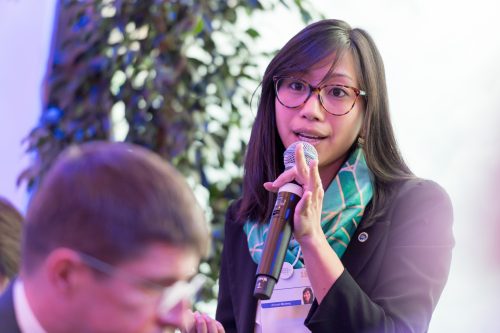 To prevent the next disabled generation from feeling adrift in the alienation of isolation, it’s imperative that the disability community continues to democratize disability. “Growing up, I never saw anyone who looked like me. I am a disabled Asian woman. The strides that we’re making from an AAPI representation perspective and even a women’s representation perspective, if those are only happening now or in the last couple of years, it makes me hopeful as we’re moving forward in the disability space. I think for me, democratization of visibility is really for any little Tiffanys out there, do they now have possibility models or role models of who they can become?” First, we must dispel the notion that you have to be visibly disabled to be “actually” disabled. “For a long time after I became disabled, I didn’t identify as disabled because I had a narrow lens where I thought disability was signified by someone who was a wheelchair user. Even as I started my work, I was like, ‘Am I ‘disabled enough’ to be doing this work? I have now learned that you’re always enough in whatever you decide you want to be,” she chuckles. Disability representation should be as diverse as those who live with disabilities themselves. “We need more intersectionality and seeing especially more BIPOC disabled folks get an opportunity to shine and get represented in media and marketing if that’s what they want to do.” Tiffany’s own odyssey is a reminder that disabled people can and should thrive across every sector. “I look back at my own professional career and I started out as an investment banker and then I was a recruiter and I was a TV news journalist and then went back into corporate finance and then was in a sales role. And now, for the last six years, I’ve been doing this disability advocacy work full-time. And so I think about not only democratization of visibility in terms of what we see on screen or media and in the entertainment industry, but also in all of these different industries so that we know we have an opportunity to access leadership if we want to.”
To prevent the next disabled generation from feeling adrift in the alienation of isolation, it’s imperative that the disability community continues to democratize disability. “Growing up, I never saw anyone who looked like me. I am a disabled Asian woman. The strides that we’re making from an AAPI representation perspective and even a women’s representation perspective, if those are only happening now or in the last couple of years, it makes me hopeful as we’re moving forward in the disability space. I think for me, democratization of visibility is really for any little Tiffanys out there, do they now have possibility models or role models of who they can become?” First, we must dispel the notion that you have to be visibly disabled to be “actually” disabled. “For a long time after I became disabled, I didn’t identify as disabled because I had a narrow lens where I thought disability was signified by someone who was a wheelchair user. Even as I started my work, I was like, ‘Am I ‘disabled enough’ to be doing this work? I have now learned that you’re always enough in whatever you decide you want to be,” she chuckles. Disability representation should be as diverse as those who live with disabilities themselves. “We need more intersectionality and seeing especially more BIPOC disabled folks get an opportunity to shine and get represented in media and marketing if that’s what they want to do.” Tiffany’s own odyssey is a reminder that disabled people can and should thrive across every sector. “I look back at my own professional career and I started out as an investment banker and then I was a recruiter and I was a TV news journalist and then went back into corporate finance and then was in a sales role. And now, for the last six years, I’ve been doing this disability advocacy work full-time. And so I think about not only democratization of visibility in terms of what we see on screen or media and in the entertainment industry, but also in all of these different industries so that we know we have an opportunity to access leadership if we want to.”
Even as we break down barriers, we still need a space to decompress and replenish our capacity to cope. “In 2021 we launched a membership community called the Diversability Leadership Collective to accelerate disability advocacy and leadership. We want to be able to help curate visibility and speaking opportunities for our community members to build thought leadership. One of the things we’ve been managing within our community is yes, it’s very focused on leadership. Let’s get you featured. But we also want to have a softness there, so we have a subgroup called Real Talk when things are hard because existing in an ableist society that wasn’t built for us is going to be hard sometimes.” Tiffany vividly remembers the soul-warming rejuvenation that community care can provide. “My first TED Talk was all about community. Part of the reason why I came up with the idea for Diversability in college was because from my freshman year to my junior year, I had co-founded a Taiwanese American club and in the Taiwanese American Club, I found community, I found culture, I found pride. I wasn’t really out to become a disability advocate. I thought that if I just did this for one aspect of my identity and it was so enriching and nourishing, what would it look like if there were other disabled students here who could have their place too?”
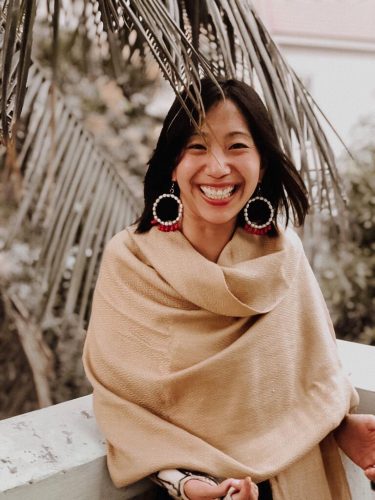 Happily, increasing numbers of people are flocking to multiple movements. “I’m seeing way more mental health conversations and I’m seeing a lot more interest in learning more about non apparent disabilities and neurodiversity in the workplace.” The community and indeed, the very concept of what it means to be disabled, has accelerated towards once unfathomable benchmarks within just the past few years. “I’m grateful that that even though I accidentally became an advocate in 2009, because I’ve been able to see over 10 years of a shift, even if I get frustrated that we’re not moving as quickly as we would like, the fact that in 2009 nobody understood what disability pride was, and now we have the White House celebrating Disability Pride Month and folks with non-apparent disabilities and chronically ill folks speaking up.” In these moments of deserved celebration, it’s equally important to remember where we came from. “I’m part of the ADA generation and I did an interview with one of my older friends and she told me that her rights to an education weren’t protected until she was in the seventh grade. I’ve never had to question that. I mean, I guess I’ve questioned it with my own internalized ableism, but I’ve never had to question my rights to belong in these spaces. In her lifetime she’s seen a lot of change. The fuel to my fire of continuing this work is that I think if we wait long enough, an entire lifetime, maybe there will be some incredible shifts.”
Happily, increasing numbers of people are flocking to multiple movements. “I’m seeing way more mental health conversations and I’m seeing a lot more interest in learning more about non apparent disabilities and neurodiversity in the workplace.” The community and indeed, the very concept of what it means to be disabled, has accelerated towards once unfathomable benchmarks within just the past few years. “I’m grateful that that even though I accidentally became an advocate in 2009, because I’ve been able to see over 10 years of a shift, even if I get frustrated that we’re not moving as quickly as we would like, the fact that in 2009 nobody understood what disability pride was, and now we have the White House celebrating Disability Pride Month and folks with non-apparent disabilities and chronically ill folks speaking up.” In these moments of deserved celebration, it’s equally important to remember where we came from. “I’m part of the ADA generation and I did an interview with one of my older friends and she told me that her rights to an education weren’t protected until she was in the seventh grade. I’ve never had to question that. I mean, I guess I’ve questioned it with my own internalized ableism, but I’ve never had to question my rights to belong in these spaces. In her lifetime she’s seen a lot of change. The fuel to my fire of continuing this work is that I think if we wait long enough, an entire lifetime, maybe there will be some incredible shifts.”
Tiffany’s aspirations are quite literally Olympic. Every stage offers a spotlight in which to shine. “Part of why I moved to Los Angeles is I want to figure out a way to get involved with the LA 2028 Olympics and Paralympics that are coming to Los Angeles. This is a huge event with so many eyeballs on it coming back to the US, which many people see as one of the most disability progressive countries. We can make some noise and make a statement.I feel hopeful for the type of splash that this event and I will say probably all of the other events surrounding it will make in terms of progress in this space.” The disability community has more strength in numbers than you might imagine. It’s a vibrant and thriving coalition that makes Tiffany smile when she recalls that lonely college student seeking belonging. “We have about 80,000 people following us across our platforms at Diversability. Thirteen years ago when I wanted to start Diversability, I applied for a small grant at my university. During the interview process they said, ‘Why do you think anyone’s going to care about this?’ And I can’t remember how I responded to that, but I probably said something along the lines of, ‘Because this is what nine year old Tiffany so desperately needed.’ Then I probably said something like, ‘If we did this for the Taiwanese Club, then I hope that there’s a space here for a disability club.’ I still remember being the only person hanging up flyers around campus for this club. We were a community of one. Now, you choose to follow us. So for the people who have opted in to join our community, we’ve got about 5,700 members in there. Now if people ask me, ‘How do you think we’re going to get people to care?’ I can point to any one of those because if I was the only one that cared, then 80,000 people wouldn’t be following us.” One person’s determination can ignite generational change.
Read more Celebrity Interviews on ClicheMag.com
Diversability Founder Tiffany Yu Launches a New Era of Disability Advocacy. Photo Credit: Courtesy of Tiffany Yu.

